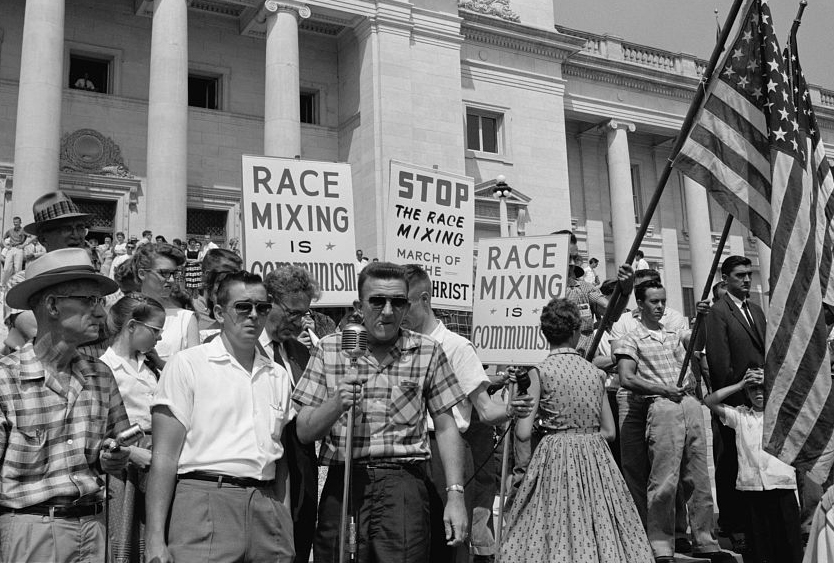

I've been reading about historical instances like Nazi Germany and other forms of white supremacy where white men were often allowed to marry non-white individuals. It's kind of perplexing considering the extreme racial ideologies they were promoting.
The topic you bring up is indeed complex and requires careful consideration. It is important to note that the issue of interracial marriage during historical instances of white supremacy, such as Nazi Germany, cannot be generalized as a consistent practice. However, there were instances where interracial relationships occurred, often due to specific circumstances or exceptions.
Nazi Germany:
While the Nazi regime promoted extreme racial ideologies and enacted policies aimed at purging "non-Aryan" individuals, there were instances where exceptions were made for interracial relationships. One notable example is the case of the "Rhineland Bastards." During the French occupation of the Rhineland after World War I, some French-African soldiers were stationed there. Relationships between these soldiers and German women resulted in mixed-race children. The Nazi regime considered these children to be a threat to their racial purity ideology and enacted policies to sterilize them. However, they did not prevent the marriages between these individuals from occurring.
United States:
In the United States, during periods of white supremacy, laws and social norms sought to maintain racial segregation and uphold white supremacy. However, there were instances where white men were allowed or even encouraged to marry non-white individuals. One example is the historical practice of white slaveholders engaging in sexual relationships with enslaved African women. These relationships often resulted in mixed-race children, known as mulattoes. While these relationships were marked by a severe power imbalance and were often non-consensual, they demonstrate how white men were able to engage in interracial relationships despite the racial ideologies of the time.
Colonialism:
During the era of European colonialism, there were instances where white men formed relationships with indigenous or enslaved women. These relationships were often facilitated by the power dynamics between colonizers and the colonized. In some cases, these relationships resulted in marriages, as seen in colonial societies such as British India, French colonies in Africa, or Spanish colonies in Latin America. These unions were sometimes encouraged as a means of assimilation or control over the indigenous population.
It is important to note that the examples provided should not be seen as justifications or endorsements of white supremacy or racism. They merely demonstrate that historical instances of white supremacy were not always consistent in preventing interracial relationships. The motivations behind these exceptions varied, including power dynamics, exploitation, or attempts at assimilation.
References:
1. Gilman, S. L. (1985). Difference and Pathology: Stereotypes of Sexuality, Race, and Madness. Cornell University Press.
2. Davis, D. B. (1983). The problem of slavery in the age of revolution, 1770-1823. Oxford University Press.
3. Hodes, M. (1999). White women, black men: Illicit sex in the nineteenth-century South. Yale University Press.
Related Posts
© 2025 Invastor. All Rights Reserved

User Comments
Abelardo Sutton
2 years ago
Definitely. It's through discussions like these that we can learn from the past and strive to create a more just and equitable future.
Kennedy Larson
2 years ago
Well said. This kind of conversation helps us gain a deeper understanding of the human experience and the intricacies of oppressive ideologies
Kennedy Larson
2 years ago
And it reinforces the importance of critically examining history and acknowledging these complexities rather than oversimplifying them.
Shea Oakley
2 years ago
Absolutely. It's a reminder that we can't fully understand historical events without delving into the motivations, circumstances, and individual choices that shaped them.
Ellis Fowler
2 years ago
True, and it also serves as a reminder that history is often more complex than we initially perceive. Exploring these contradictions helps us understand the nuances of power dynamics and how they play out in different societies.
Abelardo Sutton
2 years ago
I guess it just highlights the intricacies and contradictions within these oppressive systems. It's a reminder that even the most rigid ideologies can't completely control every aspect of human behavior.
Mavis Garcia
2 years ago
Plus, these regimes weren't monolithic. There were individuals within them who might have had differing opinions or may have been willing to bend the rules for their own benefit.
Kennedy Larson
2 years ago
It's also worth considering that people are complex beings. Just because someone was part of a regime that promoted white supremacy doesn't mean they didn't have their own personal feelings, attractions, or motivations that diverged from the official ideology.
Shea Oakley
2 years ago
And don't forget that these regimes were also interested in increasing their own power and influence. Allowing alliances or connections with non-white groups might have served some strategic or political purposes.
Ellis Fowler
2 years ago
Hypocrisy does seem to be a common thread in these instances. It's like there was a gap between the ideological rhetoric and the pragmatic realities on the ground.